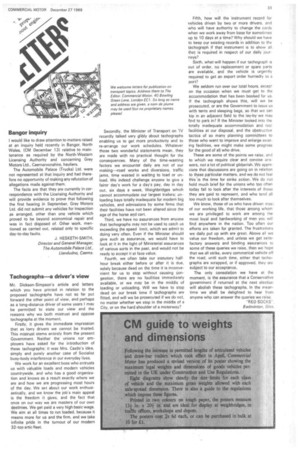Tachographs—a driver's view
Page 35

If you've noticed an error in this article please click here to report it so we can fix it.
Mr. Dickson-Simpson's article and letters which you have printed in relation to the proposed tachographs have not so far put forward the other point of view, and perhaps as a long-distance driver of some years I rosy be permitted to state our view and the reasons why we both mistrust and oppose tachographs at the moment.
Firstly, it gives the immediate impression that as lorry drivers we cannot be trusted. This mistrust stems entirely from the present Government. Neither the unions nor employers have asked for the introduction of these tachographs; it was Mrs. Castle's idea, simply and purely another case of Socialist busy-body interference in our everyday lives.
We work for an excellent boss who entrusts us with valuable loads and modern vehicles countrywide, and who has a good organization and knows as a result exactly where we are and how we are progressing most hours of the day. We set about our work enthusiastically, and we know the job's main appeal is the freedom it gives, and the fact that once on our way we are masters of our own destinies. We get paid a very high basic wage. We aim at all times to run loaded, because it means more for us and the firm, and we take infinite pride in the turnout of our modern 32-top artic fleet. Secondly, the Minister of Transport on 1V recently talked very glibly about tachographs enabling us to get more productivity and to re-arrange our work schedules. Whatever those two wonderful statements mean, they are made with no practical thought for the consequences. Many of the time-wasting factors we encounter daily are not of our making—road works and diversions, traffic jams, time wasted in waiting to load or unload. We indeed challenge anyone to give a fairer day's work for a day's pay, day in day out, six days a week. Weighbridges which cannot accommodate our largest trailers: unloading bays totally inadequate for modern big vehicles, and admissions by some firms that their facilities have not been altered since the age of the horse and cart.
Third, we have no assurances from anyqne that tachographs may not be used to catch us exceeding the speed limit, which we admit to doing very often. Even if the Minister should give such as assurance, we would have to look at it in the light of Ministerial assurances of various sorts in the past, and would not be ready to accept it at face value.
Fourth, we often take our statutory halfhour break either before or after it is due, solely because dead on the time it is inconvenient for us to stop without causing congestion, there are no facilities immediately available, or we may be in the middle of loading or unloading. Will we have to stop dead on our break time if tachographs are fitted, and will we be prosecuted if we do not, no matter whether we stop in the middle of a City, or on the hard shoulder of a motorway? Fifth, how will the instrument record for vehicles driven by two or more drivers, and who will have authority to change the cards when we work away from base for sometimes up to 10 days at a time? Why should we have to keep our existing records in addition to the tachograph if that instrument is to show all that is required in respect of our daily journeys?
Sixth, what will happen if our tachograph is out of order, no replacement or spare parts are available, and the vehicle is urgently required to get an export order hurriedly Lo a port?
We seldom run over our total hours, except on the occasion when we must get to the accommodation that has been booked for us. If the tachograph shows this, will we be prosecuted, or are the Government to issue us with tents and sleeping bags, so that we can kip in an adjacent field to the lay-by we may find to park in? If the Minister looked into the totally inadequate accommodation and rest facilities at our disposal, and the obstructive tactics of so many planning committees to those who want to improve and enlarge existing facilities, we might make some progress for the good of all who drive.
These are some of the points we raise, and to which we require clear and concise answers, not a lot of political gibberish. We appreciate that discussions are going on in relation to these particular matters, and we do not feel this is the time for strike action. We do not hold much brief for the unions who too often today fail to look after the interests of those they are paid to represent, and who tend all too much to look after themselves.
We know, those of us who have driven most of our working life, that those among whom we are privileged to work are among the most loyal and hardworking of men you will find anywhere in the nation. Too often our efforts are taken for granted. The frustrations we daily put up with are great. Above all we value our freedom, and unless we get satisfactory answers and binding assurances to some of these queries we raise, then we hope that we all strike, every commerical vehicle oft the road, until such time, either that tachographs are scrapped, or if approved, they are subject to our acceptance.
The only consolation we have at the moment, is the assurance that a Conservative government if returned at the next election will abolish these tachographs. In the meantime we shall be delighted to hear from anyone who can answer the queries we raise. "RED SOCKS". Badminton, Glos.












































































